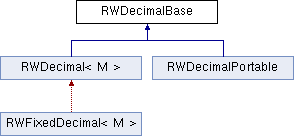 SourcePro® 2020 |
SourcePro® API Reference Guide |
Product Documentation: SourcePro Documentation Home |
Base class for the family of Rogue Wave decimal classes. More...
#include <rw/tools/decbase.h>

Public Types | |
| enum | Op { assign, add, sub, mult, div, powop, pow10op, conversion } |
| enum | RoundingMethod { PLAIN, UP, DOWN, BANKERS, TRUNCATE } |
| enum | State { normal, nullstate, NaNstate, ctorError, missingstate, SNaNstate, infinitystate } |
Public Member Functions | |
| void | swap (RWDecimalBase &rhs) |
The base class for the different RWDecimal classes. This class provides the definition of enums used in the derived classes and in the related classes RWDecimalInexactErr and RWDecimalOverflowErr.
| enum RWDecimalBase::Op |
An enumeration defining the operation that caused the error handler to be called.
| Enumerator | |
|---|---|
| assign |
|
| add |
|
| sub |
|
| mult |
|
| div |
|
| powop |
|
| pow10op |
|
| conversion |
|
Rounding methods used by RWDecimalPortable::round()
The following table shows the results of the different rounding methods.
| Method | 1.25 | 1.35 | 1.251 |
| PLAIN | 1.3 | 1.4 | 1.3 |
| UP | 1.3 | 1.4 | 1.3 |
| DOWN | 1.2 | 1.3 | 1.2 |
| TRUNCATE | 1.2 | 1.3 | 1.2 |
| BANKERS | 1.2 | 1.4 | 1.3 |
| Enumerator | |
|---|---|
| PLAIN |
Round up on a tie. |
| UP |
Always round up. |
| DOWN |
Always round down. |
| BANKERS |
On a tie, round so that last digit is even. |
| TRUNCATE |
Same as DOWN. |
| enum RWDecimalBase::State |
An enumeration defining the state of the object.
Operations on these enum values apply the following rules from top to bottom (as the operation is evaluated, the first rule that matches is applied).
| Operand | Operation | Behavior | Examples |
|---|---|---|---|
nullstate | Any | If either operand is nullstate, the other operand is returned. | nullstate + n == n |
missingstate | Any | If either operand is missingstate, missingstate is returned. | missingstate × n == missingstate |
ctorError | Any | If either operand is ctorError, ctorError is returned. | ctorError − n == ctorError |
NaNstate | SNaNstate | Any | If either operand is NaNstate or SNaNstate, NaNstate is returned. | NaNstate + n == NaNstate |
infinitystate | Addition | If either operand to + is infinitystate, infinitystate is returned. | infinitystate + n == infinitystate |
| Subtraction | If both operands to − are infinitystate, NaNstate is returned. | infinitystate − infinitystate == NaNstate | |
If the first operand to − is infinitystate, infinitystate is returned. | infinitystate − n == infinitystate | ||
If the second operand to − is infinitystate, −infinitystate is returned. | n − infinitystate == −infinitystate | ||
| Multiplication | If either operand to × is infinitystate and the other operand is 0, NaNstate is returned. | infinitystate × 0 == NaNstate | |
If either operand to × is infinitystate, infinitystate is returned, and sign is propagated according to normal multiplication rules. | infinitystate × −n == −infinitystate | ||
| Division | If both operands to ÷ are infinitystate, NaNstate is returned. | infinitystate ÷ infinitystate == NaNstate | |
If the first operand to ÷ is infinitystate, infinitystate is returned,and sign is propagated according to normal division rules. | −infinitystate ÷ 0 == −infinitystate | ||
If the second operand to ÷ is infinitystate, 0 is returned. | n ÷ infinitystate == 0 |
SNaNstate does not generate signals, unless converted to a double or long double and used in double arithmetic.
|
inline |
Swaps the data owned by self with the data owned by rhs.
|
Copyright © 2020 Rogue Wave Software, Inc. All Rights Reserved. |